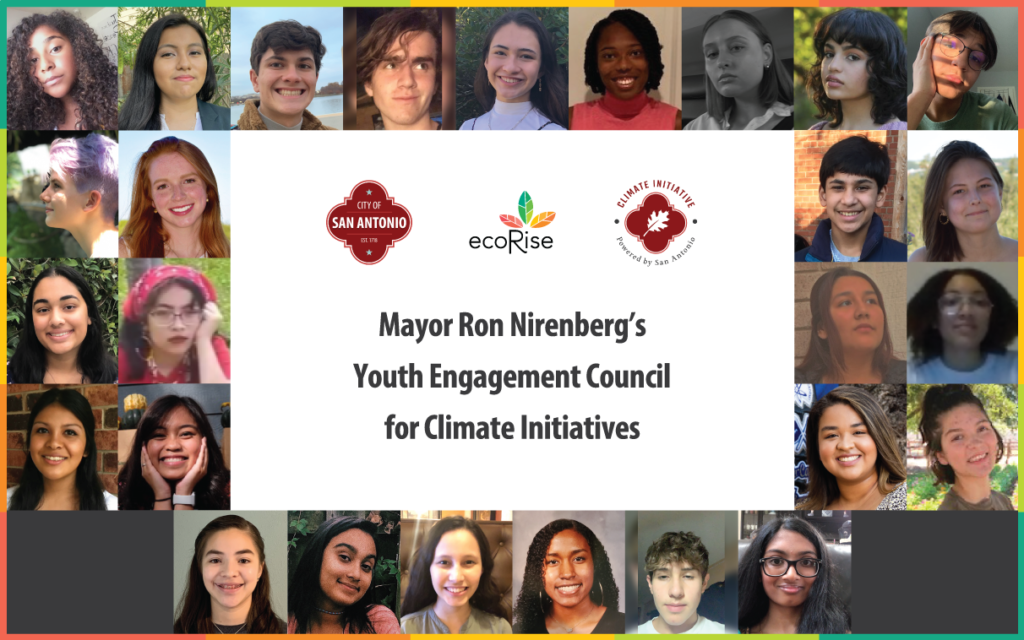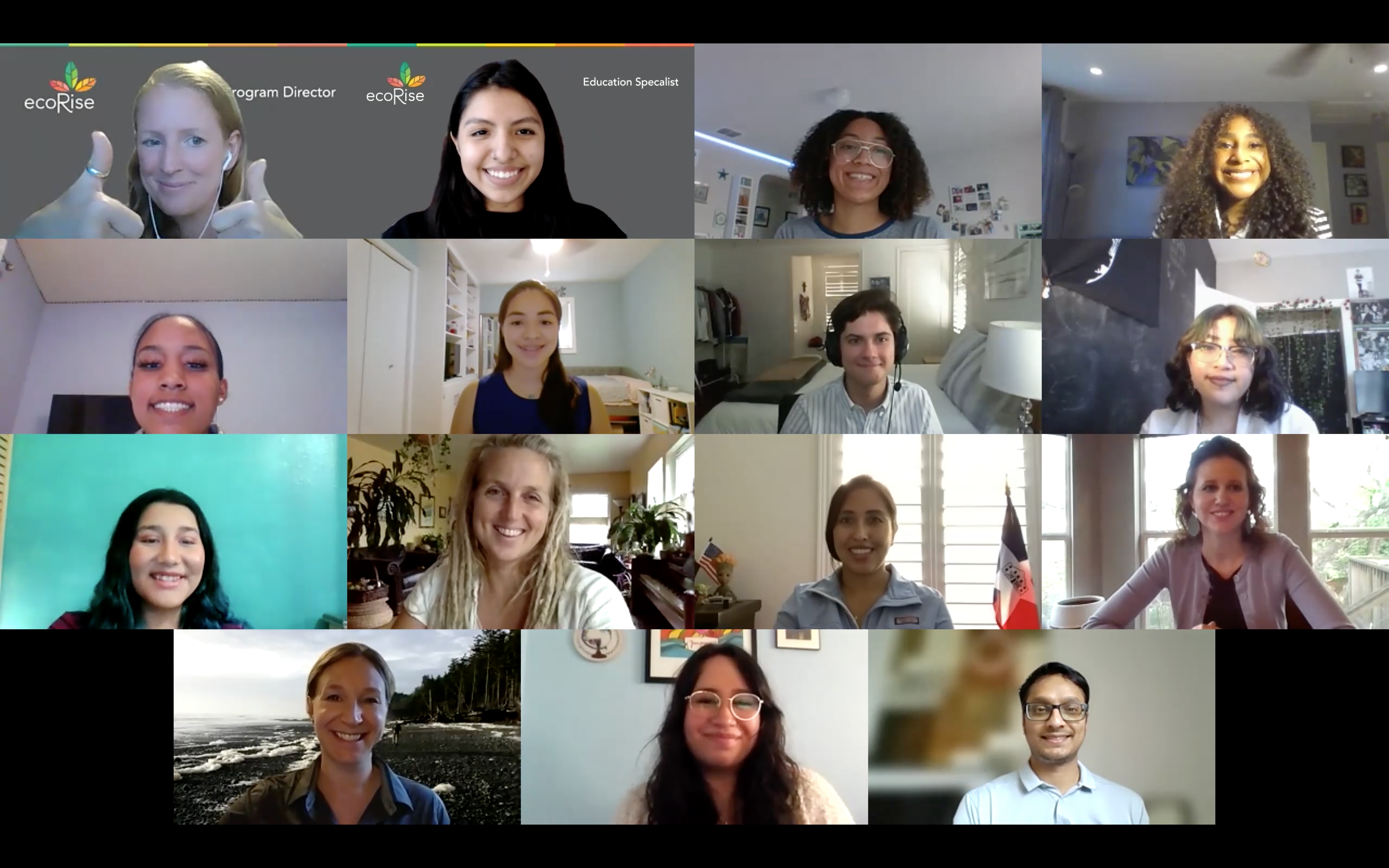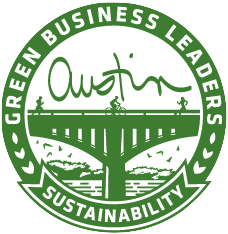
Youth Council representing communities across the city presented community impact projects and policy recommendations
San Antonio, Texas (June 11, 2021) — The first cohort of the Mayor’s Youth Engagement Council for Climate Initiatives in San Antonio wrapped up its academic year work last month by presenting the community impact projects members have been implementing in San Antonio this spring and detailing policy recommendations to Council Members and City of San Antonio employees.
In its first year, the Council consisted of 35 area youth, representing each City Council district and 23 different schools, including public, private, charter, and homeschool. Led and facilitated by EcoRise, with support from the City of San Antonio Mayor’s Office and the Office of Sustainability, the mission of the Council has been to empower San Antonio’s next generation of climate champions with the tools they need to actively participate in effective civic action and invest in the future of their city.
“I formed the Mayor’s Youth Engagement Council for Climate Initiatives to empower future decision-makers in our community,” said Mayor Ron Nirenberg. “Curbing the impacts of climate change will require the brain power of the world’s best and brightest, and we can nurture that here at home.”
This school year, students on the Council have virtually participated in monthly convenings and workshops as well as met with Mayor Ron Nirenberg, their City Council Members, other city officials, guest speakers, and community organizations. Members of the Council were featured in the SA Climate Ready Forum in December and on the KLRN Earth Day Panel in April. The Council formed four sub-committees, aligned to the goals of the San Antonio Climate Action and Adaptation Plan (CAAP), to research community equity issues and design and implement community impact projects to address the issues. The subcommittees also researched and developed policy recommendations in the categories.
- The Infrastructure, Energy, and Recycling group has produced an educational video for elementary and middle school students that explains what renewable energy is and what local sources of energy are used locally and is planning to host a webinar with the City of San Antonio about how to recycle in San Antonio. Their policy proposals included re-categorizing mixed-district zones to increase density and reduce urban sprawl and banning single-use plastic bags.
- The Biodiversity group worked with the San Antonio River Authority to create bug hotels— structures that act as a nest and breeding area for pollinators—to preserve and increase bug populations and biodiversity in San Antonio. They also proposed policy that uses green spaces to preserve bug populations and reduces the amount of polluted runoff in the San Antonio River.
- The Transportation and Housing group collaborated with VIA Metropolitan Transit to design and plan a pilot that will add a rooftop garden to bus shelters which will increase habitat for local pollinators and have mitigate urban heat island effect. Their policy recommendation focused on providing subsidies that would set a percentage of housing stock at a set price and encourage use of sustainable building materials.
- The Community Health and Food Security group plans to create a non-profit, Garden of Plenty, that meets community health needs by starting a community garden, advocating and creating more green spaces, getting involved with local schools, and using social media as a tool to spread awareness. They recommended policy that would create more green spaces for the most underserved San Antonio districts and improving mental health resources.
“Learning about how to write policy recommendations, arranging meetings with city council members, and learning about local EJ <environmental justice> issues, especially the impact of redlining in relation to climate change, were all very impactful and effective when it came to finding solutions to the problems I learned about within my community,” one youth council member said in reflection about their year.
“The growth of these young changemakers is evident in the solutions they are implementing and the enthusiasm and advocacy for social issues most relevant to their communities,” said EcoRise Program Director Kristi Hibler-Luton. “EcoRise is so proud of the first cohort of Council Members, and we look forward to civically empowering more youth through next year’s Council.”
Six youth council members were selected for the paid Summer Youth Climate Internship Program. These students will work with partners and EcoRise educators to dive deeper into San Antonio’s CAAP and climate-related initiatives. The MYECCI was made possible by a grant from the Hollomon Price Foundation, facilitated through San Antonio’s participation in the Bloomberg Philanthropies American Cities Climate Challenge. For more information on the city’s CAAP, visit www.sanantonio.gov/sustainability. The application window for next year’s Mayor’s Youth Engagement Council for Climate Initiatives will begin in August, please check back at www.ecorise.org/youthclimatecouncil.

About EcoRise
EcoRise develops the next generation of green leaders by enlivening conventional classrooms with academically aligned K–12 curricula that introduce students to environmental literacy, social innovation, and hands-on design skills. EcoRise is currently supporting over 4,000 teachers in helping over 246,000 students solve real-world sustainability challenges concerning energy, water, waste, transportation, air quality, food, and public spaces. The program focuses on enhancing STEM education, promoting sustainability, introducing students to green careers, and helping students develop 21st-century skills. To learn more about EcoRise, visit www.ecorise.org.
San Antonio: America’s 21st Century City
San Antonio is a global city with a dynamic economy and workforce, a deep cultural heritage and diverse communities that are resilient and welcoming. It is one of the strongest fiscally managed cities in the country, nurturing entrepreneurship, encouraging investment and funding infrastructure. America’s seventh-largest city offers a vibrant business climate and growth opportunities in bioscience, financial services, aerospace, cybersecurity, energy, transportation, manufacturing and healthcare. In 2015, UNESCO designated San Antonio’s 18th century Spanish colonial missions as a World Heritage Site – the first in Texas. Proudly called Military City, USA®, San Antonio is home to one of the largest populations of active duty military, veterans and crucial military commands. For more information, visit www.sanantonio.gov.




